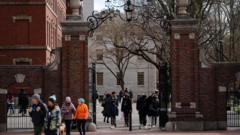The Trump administration has issued a stark ultimatum to Harvard University, threatening to ban the institution from enrolling foreign students unless it complies with sweeping demands intended to combat antisemitism. Harvard's leadership, emphasizing the importance of its independence, rejects these demands, anticipating potential repercussions in funding and tax-exempt status.
Harvard Faces Potential Foreign Student Ban Following Trump Administration Demands

Harvard Faces Potential Foreign Student Ban Following Trump Administration Demands
Harvard University is at odds with the Trump administration over new demands aimed at combating campus antisemitism, with threats of losing foreign student enrollment and federal funding.
The Trump administration has issued a severe ultimatum to Harvard University, threatening to bar the institution from enrolling foreign students after President Donald Trump’s administration made sweeping demands to combat antisemitism on campus. Harvard President Alan Garber firmly rejected the administration’s requirements, which include alterations to the university's hiring, admissions, and teaching practices, insisting that the university would not compromise its independence or violate its constitutional rights.
Homeland Security Secretary Kristi Noem has requested documentation regarding what she deemed the "illegal and violent" actions of foreign student visa holders at Harvard. In response to the university's earlier statements of commitment to addressing antisemitism, Noem's letter warned that failure to comply with these requests could result in Harvard losing the "privilege of enrolling foreign students." Currently, international students comprise over 27% of Harvard’s enrollment.
The stakes are high, as Harvard is already facing a freeze on approximately $2.2 billion in federal funding, which adds to the financial uncertainty surrounding the institution. The Trump administration has not only threatened to revoke the university’s ability to enroll foreign students but is also considering the removal of Harvard’s tax-exempt status, a move that could financially cripple the university. Harvard has countered this claim, stating that there is "no legal basis" to alter its tax-exempt status and warned that such an unprecedented action would jeopardize its educational mission.
Trump has voiced particular disdain for Harvard, labeling it a "not decent place of learning." He has ramped up these criticisms amid a broader campaign against universities he accuses of stifling conservative viewpoints. This push is part of a continued scrutiny of higher education institutions where pro-Palestinian activism has been prominent, including actions directed at Columbia University, which recently complied with demands to restore federal funding.
While Harvard has made some concessions, including personnel changes in its Middle Eastern Studies department, it remains resolute against the recent demands posed by the White House. The unfolding situation raises pressing questions about the future of Harvard’s enrollment policies and its financial stability in the face of government pressure.






















